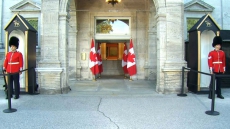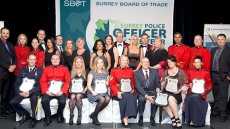MISSISSAUGA, Ont. — Hundreds of refugees from Syria were able to experience religious freedom for the first time in years as they gathered at a conference of 25,000 Ahmadiyya Muslims in Mississauga, Ont., this weekend.
Wissam Alburaki, 41, brought his wife and three children to Canada as refugees last month, landing in Calgary by way of Kuwait and Dubai.
And while Calgary is where his family intends to stay, Alburaki was west of Toronto over the weekend, attending Canada's Jalsa Salana — an annual meeting of the Ahmadiyya Muslim Jama'at.
He was one of hundreds of Syrian refugees attending the conference, according to Safwan Choudhry, a spokesperson for the Canadian chapter of the group.
Members of the Islamic sect are estimated to be in the tens of millions, Choudhry said.
And this year marks the 40th anniversary of the convention in Canada, which was attended by the community's spiritual leader, Caliph Hazrat Mirza Masroor Ahmad, who is from Pakistan.

"It's very difficult to express my feelings. Before, we were seeing this on TV," Alburaki said. "But now we are in — we are part of this. So it's very difficult to express it by words, especially when English is not your first language."
His family converted to the Ahmadiyya sect of Islam in the 1980s, he said. And since then, he's listened to what the Caliph has to say.
But being in Canada, he was able to hear the leader speak in person for the first time.
"With the situation in our country — in Syria — we cannot do this. It's a very large convention. We are meeting people from all over the world."
Alburaki said that level of diversity, and of religious freedom, is something he wasn't able to experience in Syria in recent years.
Choudhry said the Ahmadiyya community is frequently persecuted in the Muslim world because the community interprets the Qur’an differently. It believes that the promised Messiah came in the 19th century and advocates for the separation of Mosque and state.
Persecution is especially present in Syria, Choudhry said, where many Ahmadiyya Muslims are forced to practise in secret.
"For many people, it's actually more than the freedom of speech, to be able to practice your faith and profess to your God the way that you wish to, and nobody will object to it," he said.

"You can imagine how fulfilling and powerful it is for them to know that they can practise their faith in peace. Many of the Syrian refugees ... could have never imagined going to such a convention in Syria."




